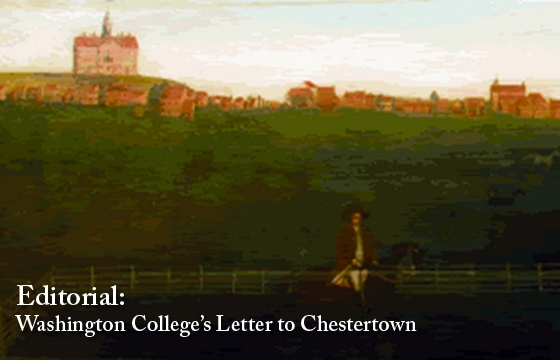Late last week, Washington College Interim President Jay Griswold sent off a ten page letter to Chestertown’s mayor and town council outlining not only the 238 year-old school’s current strategic plan but also specific goals for expanding the college’s physical footprint on campus as well as along the Chester River waterfront. It is an extraordinary document in a number of ways.
In the first place, it is exceptionally transparent. The college has made very public their needs in student enrollment, faculty expansion, and campus infrastructure, and also relatively firm numbers of what those projects will cost to remain a sustainable and competitive institution. It has also shared with the community its fundraising goals and progress to date well before making a public announcement to launch an unprecedented $200 million capital campaign, something very few colleges or universities have been willing to disclose.
The letter also asks in a very public way for specific assistance from the town. The college openly requests consideration for very specific zoning changes and the town’s comprehensive plan. And many of those recommendations, if implemented, would have serious and far-reaching consequences for all who live here.
Even before the debate starts on Washington College’s proposals, school leadership should be thanked by the community for providing such a comprehensive and useful summary of need and circumstances. Gratefully, there will be no backroom rumors here.
But if there was one fault in President Griswold’s message, it was that the letter did not clearly state the troubled waters Washington College faces. Perhaps not today nor tomorrow, but in the not too distant future, Chestertown’s liberal arts college, without a sustainable number of students, capital enhancements, and seriously needed campus maintenance, will indeed become, as former WC president Douglass Cater famously warned, a very endangered species.
While parent outrage of higher tuition costs for both public and private schools is well documented in the media, the less frequently reported reality is that a number of these institutions have simply ceased to exist as a result of remaining stagnant or lack of planning.
This can already be seen nationally. Schools that are the most vulnerable, those with no/low endowments or accreditation issues, have already started to disappear. And in time, marketplace forces like supply and demand and return on investment will place hundreds of other higher education institutions at serious risk of experiencing a similar fate.
To be clear, it is in Chestertown’s paramount interest to make sure Washington College is not one of those institutions. One can only shudder at the thought, and the devastating economic, cultural and intellectual consequences, of an anemic and faltering school on Washington Avenue.
Nonetheless, the college is asking for much in their letter. Their proposals regarding land use, as well as residential and commercial development, are not exercises in subtle tweaking. Collectively, they represent fundamental changes in policy that would have a lasting impact on Chestertown’s landscape.
It is also important to note that zoning regulations and the town’s comprehensive plan are purposely designed to resist modifications, even good ones, particularly if they are being sought by large institutions, for profit or nonprofit, now commonly referred to as “special interests.” National town planning history is filled with countless examples of those kinds of special interests manipulating local governments to make zoning changes that have ultimately lead to degraded communities. These protective roadblocks make good sense in this regard.
But these tools can also be used to create a constructive conversation about the future of the town and its college. It is hoped that will be the case for our town council, its planning commission, and Washington College itself, as they enter into serious discussions over next few months.
A healthy dialogue with the town and WC on the future of North Chestertown, Morgnac Road, the Chester River waterfront, Stepne Manor, and the downtown historic district, has been long overdue. With both Chestertown and Washington College both facing many years of serious and numerous economic threats, the time for a meaningful and long term collaboration is now at hand.



Write a Letter to the Editor on this Article
We encourage readers to offer their point of view on this article by submitting the following form. Editing is sometimes necessary and is done at the discretion of the editorial staff.